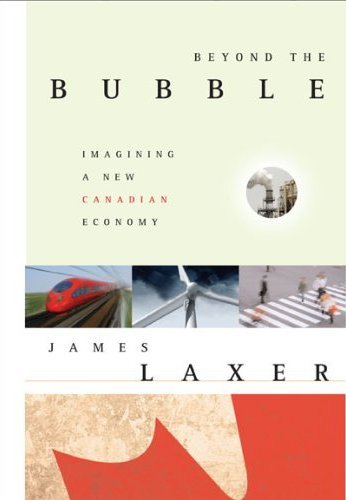James Laxer’s new book Beyond the Bubble: Imagining a New Canadian Economy pulls the curtain back to reveal the deliberately-obfuscated workings of the North American economy, and perhaps the best way for me to illustrate just how important a work I think he’s wrought is by pulling back the curtain on my reviewing style: not one to mark up a book’s margins with pen or pencil marks, I will sometimes opt for the subtle dog-earing of a page when I find a passage of note. Early into the process of reading Beyond the Bubble, I decided that whenever I came across a particularly illuminating line, a passage that I thought communicated an important, complex idea in Laxer’s sober, accessible style, I would gently turn down the corner of the page, so as to be able to find it again when the time came to write this review. Once I’d finished reading, I looked down at the book in my hands; it looked at though I’d mashed it up against a concrete wall.
The myriad dog-ears that I left littered through Laxer’s book certainly speak to the great number of explanatory gems he’s produced, the almost constant moments of realization and recognition that attend his patient history of bubble economics ever since “the tulip bubble” of “1620 to 1637.” But they also help to illustrate an economic point: six or seven dog-ears in a book are useful; but a dog-ear boom like my copy went through keeps going until it devalues the currency — a dog-ear on every third page won’t help you find anything. Similarly, a few guys flipping houses or selling bad loans may make a lot of money — a whole society trying to do the same thing turns into something way too close to a Ponzi scheme, and the result, as we saw recently, can be disastrous.
After his powerful introduction, “The Passing of a World Age,” a good-riddance eulogy for the U.S.-centred age of neo-liberal globalization, Laxer’s book is divided into two main parts: “Anatomy of the Crash” and “The Crash in Canada.” The first consists of a survey history of bubble economics (from 1620s tulips through 1920s Florida swamp land to more recent dot coms and housing), calmly refuting several opinions which have become, undeservedly, economic shibboleths in recent decades (starting with the ‘common sense’ idea that owning a house is a guaranteed fortune-maker; Laxer neatly disabuses his readers of this suburban legend). Outlining the macroeconomic history of the 20th century, Laxer escapes the common trap of viewing economics as a series of inevitabilities — he puts the ‘political’ back in political economy, highlighting the importance of social factors in determining economic trajectories. Most helpful is his situation of the post-WWII social democratic and welfare states of the West in the proper context of the then-recent struggle against fascism as well as the relative strength of the labour movement and its attendant ability to force concessions.
For people (like this reviewer) who are apt to furrow their brows during any discussion of the gold standard or current account deficits, Laxer writes accessibly, explaining the rise and inevitable fall of the American empire, and the contradictory relationship between China and the United States. Those who follow Laxer’s political writing elsewhere may find stretches of the present work a little dry; he sometimes has trouble integrating his easy-flowing, lucid analytical prose with his notation of data and outlining of international transactions. But then he’ll find his pen again and get on to a good narrative tear.
The second, Canada-focused part of the book is an invaluable survey of our country’s economic history as well as a welcome revitalization of the classic Waffle economic nationalism that Laxer was once known as the standard-bearer for. It must be hard for a person who pointed out decades ago the inherent problems with hitching our country’s industrial wagon to the star of the American auto industry not to wallow in I-told-you-so haughtiness; not least because these days hitching a star to a wagon is just about as reliable a way to get from point A to point B as is driving most GM, Ford or Chrysler autos. But he does it. He also presents a more sophisticated version of the old staples theory to explain that relying uniquely on tar sands exports to the United States is just as much of a dead end as was selling beaver hats to the Europeans, only this time it’s also a dead end for the planet. Laxer doesn’t integrate ecology into his economics as radically as some might like, but his case that massive public funding should be poured into revitalizing Canadian manufacturing through the production of high-speed trains, greener cars and aviation ought to be common sense at this point.
Laxer’s view for the country is clearly from Ontario: this Vancouver reviewer couldn’t help but notice that for all the talk of automotive, forestry got about as much mention as tulips in this manifesto for a new Canadian economy (to say nothing of the billion dollar marijuana industry, whose continued criminalization robs the public coffers of untold millions every year). But Laxer’s ideas should be tweaked and adapted in the discussion that rightly should come out of this very important contribution to the discussion.
In the vacuum left by a parliamentary left more interested in politicking than imagination, and more interested in exploiting the weakness of Michael Ignatieff than the weakness of neo-liberalism’s once-untouchable ideological hegemony, Laxer’s creativity and clear-headedness are worth dog-earing the hell out of.
Charles Demers is an author, activist and comedian. He can be heard regularly on CBC radio’s The Debaters, and his book of essays Vancouver Special has been shortlisted for the Hubert Evans BC Bookprize for Non-Fiction.




